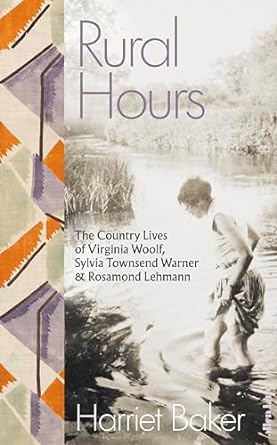Rural Hours

1917. Virginia Woolf arrives at Asheham, on the Sussex Downs, immobilized by nervous exhaustion and creative block.
1930. Feeling jittery about her writing career, Sylvia Townsend Warner spots a modest workman’s cottage for sale on the Dorset coast.
1941. Rosamond Lehmann settles in a Berkshire village, seeking a lovers’ retreat, a refuge from war, and a means of becoming ‘a writer again’.
Rural Hours tells the story of three very different women, each of whom moved to the country and was forever changed by it.
We encounter them at quiet moments – pausing to look at an insect on the windowsill; jotting down a recipe; or digging for potatoes, dirt beneath their nails. Slowly, we start to see transformations unfold. Invigorated by new landscapes, and the daily trials and small pleasures of making homes, they emerge from long periods of creative uncertainty and private disappointment; they embark on new experiments in form, in feeling and in living. In the country, each woman finds her path: to convalescence and recovery; to sexual and political awakening; and, above all, to personal freedom and creative flourishing.
Graceful, fluid, and enriched by previously untouched archival material, Rural Hours is both a paean to the bravery and vision of three pioneering writers, and a passionate invitation to us all: to recognize the radical potential of domestic life and rural places, and find new enchantment in the routines and rituals of each day.
An absorbing study of the impact of country living on Woolf, Townsend Warner & Lehmann. A meditative exploration of renewal, visionariness―interior & exterior, generative & tormenting―grievous loss, & love―cool & passionate, fragile & enduring — David Hayden
A superb portrait of the complex imprint the countryside makes on the life of the mind, this exquisite book reveals three writers, each vividly drawn in the particularities of her own surroundings, her own difficulties and joys. This book is a thoughtful exploration of rural life and creativity, drawing on deep archival roots and Harriet Baker’s unique warmth and eloquence. A treasure — Doireann Ní Ghríofa, author of A Ghost in the Throat
In this warm, perceptive, eloquent study, Harriet Baker collects some overlooked moments in these women’s lives, and with great honesty and empathy, captures what it felt like to live and write through them. Like Baker’s protagonists in their countryside boltholes I felt “socketed” by this book. I know I’ll return to it again and again — Lauren Elkin, author of Flâneuse and Art Monsters
The country life, with its dogs and flowers and sunsets, its leaky roofs and depression and boredom, has been an essential part of so many artists’ lives, but is often seen as a weekend escape — a quiet footnote to the more exciting drama of urban striving. Harriet Baker places rural hours at the center of the lives of three great writers, and shows how their works were forged in places whose quiet façades masked inner struggles every bit as tumultuous as the lives of the cities they left — Benjamin Moser, author of The Upside-Down World
[A] group biography with a difference ― FT – What to Read in 2024